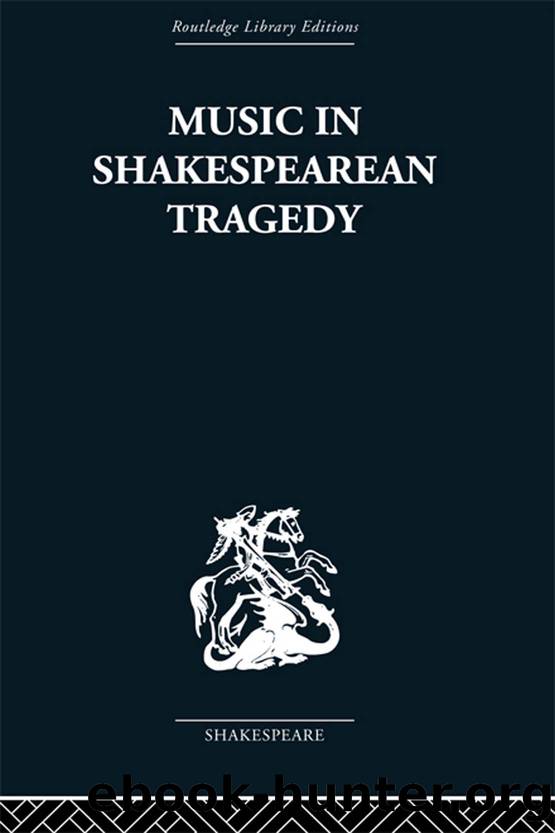Music in Shakespearean Tragedy by Sternfeld F. W.;

Author:Sternfeld, F. W.;
Language: eng
Format: epub
Publisher: Taylor & Francis Group
Facsimile I. âCome o'er the burnâ.
Ex. 6.
Ex. 7.
Ex. 8.
Appendix VII
âHe that has and a Little Tiny Witâ
Ex. 9.
Ex. 10.
No source earlier than the eighteenth century is known for this lyric. In 1772 there appeared in London a volume of songs from the repertory of the famous Vauxhall Gardens, entitled The New Songs in the Pantomime of the Witches; the Celebrated Epilogue in the Comedy of Twelfth Night . . . sung by Mr, Vernon at Vauxhall; composed by F. Vernon . . . Printed and Sold by John Johnston . . . Covent Garden, where may be had . . . King Arthur with Purcell's Chorusses. . . . The name of Purcell on the title-page reminds us that much of the music used at Vauxhall (or Drury Lane) in the eighteenth century was adapted from older sources. Whether Joseph Vernon (1738â82) composed a new tune for Shakespeare's comedy or whether he arranged a traditional melody, is difficult to determine now. In any event, an accurate transcript from the 1772 volume is given in Music Example 9.1
In 1859 William Chappell published a variation of Vernon's melody (Chappell 1.225), though, curiously, he does not mention his source. His version is in G major, while Vernon's composition is in G minor, and there are several melodic variants, though none of them change the basic contours of the tune. Chappell said of his illustration that it was
still sung on the stage to this tune. It has no other authority than theatrical tradition.
Music Example 10 reproduces Chappell's version to which the stanzas from King Lear and below it that from Twelfth Night have been fitted. It will be observed that at the end of bars 2 and 8 Chappell inserted the extra syllable âaâ (as Vernon had done before him) which is, however, neither in Shakespeare's tragedy nor in his comedy. Still, this is a small detail in a tune which may well be traditional and which soundsâat least in its surviving shapeâlike a song from a ballad opera.
The lack of antiquity in the tradition of the tune induced Wool-dridge, when he revised Chappell's standard work in 1893, to omit the song altogether, since no melody previous to Vernon's publication survives. But the lyric has been reprinted from Chappell as late as 1955 (J. H. Long, Shakespeare's Use of Music, Gainesville, Florida, p. 182) and is still widely used on the stage.
Download
This site does not store any files on its server. We only index and link to content provided by other sites. Please contact the content providers to delete copyright contents if any and email us, we'll remove relevant links or contents immediately.
4 3 2 1: A Novel by Paul Auster(11788)
The handmaid's tale by Margaret Atwood(7447)
Giovanni's Room by James Baldwin(6808)
Asking the Right Questions: A Guide to Critical Thinking by M. Neil Browne & Stuart M. Keeley(5355)
Big Magic: Creative Living Beyond Fear by Elizabeth Gilbert(5351)
Ego Is the Enemy by Ryan Holiday(4956)
On Writing A Memoir of the Craft by Stephen King(4661)
The Body: A Guide for Occupants by Bill Bryson(4580)
Ken Follett - World without end by Ken Follett(4443)
Bluets by Maggie Nelson(4260)
Adulting by Kelly Williams Brown(4232)
Eat That Frog! by Brian Tracy(4148)
Guilty Pleasures by Laurell K Hamilton(4116)
White Noise - A Novel by Don DeLillo(3829)
The Poetry of Pablo Neruda by Pablo Neruda(3813)
Fingerprints of the Gods by Graham Hancock(3733)
Alive: The Story of the Andes Survivors by Piers Paul Read(3729)
The Book of Joy by Dalai Lama(3695)
The Bookshop by Penelope Fitzgerald(3618)
